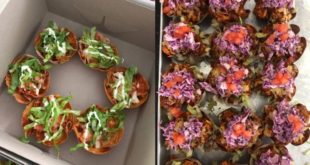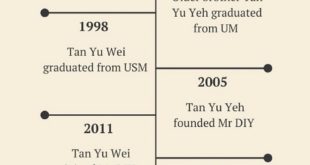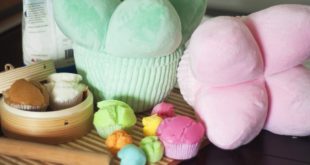Food waste is one of the biggest waste streams in Singapore and the amount of food waste generated has grown by around 20 per cent over the last decade, according to the National Environment Agency (NEA).
In 2019, Singapore generated around 744 million kg of food waste — that’s equivalent to two bowls of rice per person a day, or around 51,000 double decker buses.
Food wastage is a real problem — it does not only cause environmental problems, but also affects our food security and puts pressure on our resources.
When Preston Wong, 31, saw his family members clearing out excess expiring food items from the refrigerator one day, he wondered if a platform could be built to facilitate a redistribution of surplus food.
He pitched the idea to his National University of Singapore (NUS) schoolmate, Kenneth Ham, 30.
The duo didn’t even share the same classes — Preston majored in law and accountancy, while Kenneth majored in computer science — but they knew each other from church.
In their final year at NUS, they decided to take the leap to develop an app to tackle food wastage in Singapore by reducing the amount of buffet food that’s thrown away at the end of the day.
“Treat Food As Treasure”
Called treatsure, Preston described it as “Singapore’s first food-saving app” with a mission to get consumers to “treat food as treasure”.
It helps businesses to tackle food wastage using tech solutions, and offers consumers a new channel to discover unique food at great value while doing good to reduce waste, he added.

Although treatsure was established in 2016, the app only launched in the market in 2017.
As with most startups, we had resource constraints for capital and labour to develop the product, but we managed to pull together help from different sources to build our first version app.
– Preston Wong, co-founder of treatsure
They started up with S$ 50,000 in initial capital, and subsequently raised an undisclosed funding.
Sustainability was a rather “novel concept” back then, and it was hard to get businesses and consumers to understand and adopt their solution.
They pitched to early adopter partners like Grand Hyatt Singapore and AccorHotels, which were aligned to sustainability and supportive of their pilot testing.
When they received some traction, they went on to convince other hotels and restaurants to get onboard the platform.
Today, they have over 20 hotel partners, including Fairmont Singapore, Swissotel the Stamford Singapore, Marriott Singapore Tang Plaza, Novotel Singapore, Mercure Hotels, Hotel Jen, Carlton City and Furama.
Buffet In A Box
With their takeaway buffet-in-a-box, users can pack food from participating hotel or restaurant buffets in the last 30 to 60 minutes of the buffet timeslot, from S$ 10 per box.

How it works is that users turn up at the restaurant, scan a hotel QR code with the app, and make payment at the counter before they will be given their treatsure box as an admission ticket of sorts to proceed with their packing.
Users can buy more than one box, though some outlets set a limit of four boxes.
Preston also stressed that the app does not sell leftovers.
“The excess food a user would pack and take away is the same food as what a dine-in customer who take from the same buffet line before the buffet closes,” he explained.

Last year, treatsure sold a total of up to 20 boxes each day.
Since the circuit breaker in April however, self-serve buffets have been suspended by the government until further notice and most hotels are cautiously reopening with a la carte buffet models.
“We are still closely monitoring the developments in this space and the model may evolve accordingly. Even with an a la carte model, there might still be wastage from preparation or ingredients but that is likely to be much less than a buffet-line service,” said Preston.
“In the meantime, we have collaborated with our hotel partner Grand Hyatt to supply excess takeaway meal boxes and cheeseburgers for sale instead.“
Buy Surplus, Blemished Or Expiring Food Items

From reducing wastage of buffet food, treatsure has since expanded its services to also offer surplus grocery delivery.
Grocery wastage is part of the bigger food wastage problem affecting distributors and suppliers up the food supply chain.
We started tackling this upstream problem in 2019 with a few grocery partners. They shared with us the problems of excess food inventory with a limited shelf life or packaging defects, and limited channels to clear them.
– Preston Wong, co-founder of treatsure
Some of their early grocery partners include UglyFood, Atasco, Amoy Canning, Olive Groves and more recently, food importer and distributor Ban Choon.
However, Preston shared that they faced a key challenge working with retailers in the first version of the app, especially in terms of convincing the bigger local F&B and supermarket chains to come onboard.
“They had their perspectives and practices towards surplus food management and was not ready to accept a solution like ours.”
“It was at that time we discovered a greater magnitude of surplus food in the hospitality industry and our platform focused on that problem instead with a winning model endorsed by prominent hotels,” he added.

Now that they’ve gotten various suppliers and distributors onboard, treatsure delivers surplus, blemished or expiring items — such as fruits, vegetables, eggs, snacks and drinks — to your doorstep.
Besides the delivery option, users can also opt for self-pickup. This option was temporarily suspended, but they have since partially resumed pickup services at the Central Business District and NUS.
Unlike their buffet-in-a-box, COVID-19 has propelled demand for their surplus grocery service as more choose to stay home and order groceries online.
According to Preston, the circuit breaker months provided a particularly strong boost to their business.
“At one point, we saw our sales orders grow three to four times the pre-circuit breaker volume,” he added.
Working Towards A Zero-Waste Lifestyle

To date, treatsure has seen over 20,000 users in their food-saving community, and over 300 per cent increase in their user base year-on-year.
While growth is good, they faced a challenge in terms of technology as their user base continually increases and when they first introduced a new grocery segment in the app.
We had limited resources to execute changes and enhancements needed for pain points that we heard of from users. We reached out to our users and offered them the best customer service engagement we could provide, while explaining to them we were trying our best to find resources to improve.
Thankfully, the National Environment Agency supported us with a five-digit Towards Zero Waste grant to revamp our app and many users never gave up on us. Today, what you see is a brand new, more user-friendly app.
– Preston Wong, co-founder of treatsure
Moving forward, the team is looking to enhance their app further and build on newer technologies and innovations for food sustainability.
Currently, they are working on onboarding more grocery and suppliers so they can offer a wider range of surplus food products, as well as lifestyle partners with sustainability products that could have been repurposed from surplus food and other excess.
Some of these partners include The Sustainability Project, Bamboo Straw Girl and UnPackt.
Wrapping up the interview, Preston said that he views businesses as a force of good.
“Businesses must create purpose and impact on our society and the world.”
“We must remember why we started what we started, but we also need to be nimble to explore new, creative ways of achieving our why.”
Featured Image Credit: treatsure via Facebook / treatsure via Medium



